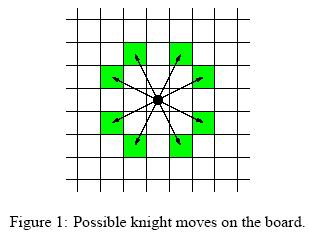poj 1915 Knight Moves
2015-01-11 17:29
302 查看
| Default Knight Moves Description Background Mr Somurolov, fabulous chess-gamer indeed, asserts that no one else but him can move knights from one position to another so fast. Can you beat him? The Problem Your task is to write a program to calculate the minimum number of moves needed for a knight to reach one point from another, so that you have the chance to be faster than Somurolov. For people not familiar with chess, the possible knight moves are shown in Figure 1.  Input The input begins with the number n of scenarios on a single line by itself. Next follow n scenarios. Each scenario consists of three lines containing integer numbers. The first line specifies the length l of a side of the chess board (4 <= l <= 300). The entire board has size l * l. The second and third line contain pair of integers {0, ..., l-1}*{0, ..., l-1} specifying the starting and ending position of the knight on the board. The integers are separated by a single blank. You can assume that the positions are valid positions on the chess board of that scenario. Output For each scenario of the input you have to calculate the minimal amount of knight moves which are necessary to move from the starting point to the ending point. If starting point and ending point are equal,distance is zero. The distance must be written on a single line. Sample Input 3 8 0 0 7 0 100 0 0 30 50 10 1 1 1 1 Sample Output 5 28 0 |
具体实现如下:
#define _CRT_SECURE_NO_WARNINGS
#include<stdio.h>
#include<stdlib.h>
#include<string.h>
#define N 300 + 2
#define INF 0x7fffff
typedef struct node
{
int x, y;
}Node;
Node Queue[100000], cur, now;
int table
, Dirct
;
void Init()
{
memset(table, 0, sizeof(table));
memset(Queue, 0, sizeof(Queue));
}
void bfs(int size, int Sx, int Sy, int Dx, int Dy)
{
int i, j, nx, ny, rear = 0, front = 0;
int dx[8] = { 1, 2, 1, 2, -1, -2, -1, -2 };
int dy[8] = { -2, -1, 2, 1, 2, 1, -2, -1 };
for (i = 0; i < size; i++)
{
for (j = 0; j < size; j++)
Dirct[i][j] = INF;
}
now.x = Sx, now.y = Sy;
Queue[rear++] = now;
Dirct[Sx][Sy] = 0;
while (front < rear)
{
now = Queue[front++];
if (now.x == Dx && now.y == Dy)
break;
for (i = 0; i < 8; i++)
{
nx = now.x + dx[i], ny = now.y + dy[i];
if (nx >= 0 && nx < size && ny >= 0 && ny < size && INF == Dirct[nx][ny])
{
Dirct[nx][ny] = Dirct[now.x][now.y] + 1;
cur.x = nx, cur.y = ny;
Queue[rear++] = cur;
}
}
}
printf("%d\n", Dirct[Dx][Dy]);
}
void solve()
{
Init();
int size, Dx, Dy, Sx, Sy;
scanf("%d %d %d %d %d", &size, &Sx, &Sy, &Dx, &Dy);
bfs(size, Sx, Sy, Dx, Dy);
}
int main()
{
int t;
scanf("%d", &t);
while (t--)
solve();
return 0;
}
相关文章推荐
- POJ 1915 Knight Moves 双向BFS 入门
- POJ 1915 BFS-Knight Moves
- (POJ - 1915)Knight Moves
- day6 POJ 1915 Knight Moves
- Poj1915 Knight Moves
- POJ 1915 Knight Moves
- poj 1915 Knight Moves
- POJ 1915 Knight Moves
- POJ 1915 Knight Moves
- POJ_1915_Knight Moves
- poj 1915 Knight Moves
- POJ 1915 Knight Moves
- POJ-1915 Knight Moves
- poj 1915 Knight Moves
- [BFS]poj 1915 Knight Moves
- POJ-1915 Knight Moves 简单搜索
- poj 1915 Knight Moves
- POJ 1915 Knight Moves
- poj1915 Knight Moves
- POJ 1915 Knight Moves
